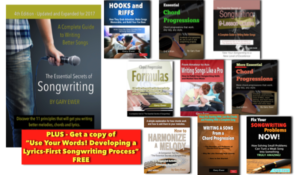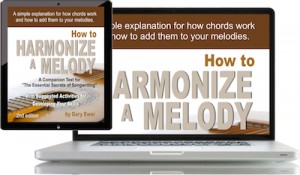 “The Essential Secrets of Songwriting 10-eBook Bundle” covers every aspect of how to write great songs. Contains a Study Guide that keeps you focused on becoming a consistently better songwriter. Get today’s FREE DEAL when you make your purchase. Click below for details.
“The Essential Secrets of Songwriting 10-eBook Bundle” covers every aspect of how to write great songs. Contains a Study Guide that keeps you focused on becoming a consistently better songwriter. Get today’s FREE DEAL when you make your purchase. Click below for details.
I was watching an interview with Phil Collins, and he was talking about the Genesis album “A Trick of the Tail” (1976). This was their first post-Peter Gabriel album, and they were auditioning for a new lead singer.
After listening to 400+ tapes, they still hadn’t found anyone, and Collins eventually wound up taking on the role. But what surprised me a little in the interview was the comment he made about the music itself as they auditioned the singers:
We weren’t even thinking about keys for singers. I mean, now, we’d say, ‘Can you sing this, or would you like us to take it down a bit?’ You know, you think about it, but we didn’t think about it then, such was our contempt for the vocals.
So we laid down all the backing tracks and invited the guy in to sing… ‘Squonk’ was the first one. And it was plainly the wrong key for the guy.
Of course, the instrumental aspect of Genesis’ music was a major part of the attraction for fans, so it’s not overly astonishing that they had that view regarding key. They wanted the key to work well instrumentally and hoped the singer would be able to handle it.
I doubt that this is a common opinion these days. I assume that, as much as possible, music is put into a key that works reasonably well for the singer. But what are the factors you need to consider when choosing key?
Logic might tell you to place a song in the middle of the singer’s range, but logic would be wrong in many cases. Among many considerations, here are 3 that are important.
1. The tone quality and range of the human voice.
Everyone has a range that works. For some, the range is small, but most good singers can access additional notes in the upper register by switching to “head voice” or “falsetto.”
But leaving falsetto and head voice aside for the moment, it’s clear that the higher you sing, the more strain a listener picks up in the vocal quality. In the classical genres, vocal strain has practically no use and is a negative quality that needs to be dealt with.
But in the pop genres, the strain we hear can have a useful impact on how we hear and interpret the song. Verse 1 of “Smells Like Teen Spirit” (Nirvana) sounds quiet and introspective. The chorus, which leaps up an octave, sounds powerful and angst-ridden, in the best sense of those words. Imagine Kurt Cobain switching to falsetto for the chorus and you realize just how important his screamy, harsh vocal style contributes to the success of the song.
As you choose your song’s key, try to get a sense of the overriding emotion and mood you want the audience to pick up. You’ll immediately understand the kind of voice you will need, and if it requires a strong powerful approach, nudge the key as high as you dare.
And of course, if you want something gentle to come forward, move the key lower. Experimenting in this regard is your best way forward. Just be aware that the sound of the voice is a large contributor to musical meaning.
2. The sound of the instruments.
Some instruments, like brass instruments (trumpet, french horn, trombone) have a similar “tessitura” issue to the voice, which is that the higher they play, the more strain and power is picked up in the sound.
Other instruments don’t have as much of a range-based effect on sound. Generally, a piano playing in the upper octaves contributes some extra musical energy, but not a lot more.
But the key’s effect on instruments is something to at least think about, particularly if you’re using “real” instruments as opposed to synthesized ones. So if you’re hoping to add a country fiddle to a song, flat keys will compromise the sound. It’s something you may need to take advice on if you don’t often write for these instruments.
3. Playability of the music.
The best scenario when it comes to playing music is that you’re comfortable playing in any key. Given the choice between choosing keys to suit the singer versus ones to suit the instrumental players in a band, I’d prefer making the singer feel right over the players.
That’s because I believe that the range of the vocal melody contributes more to musical meaning than the range of the instruments. Instruments can play in any range, really, regardless of the key. In other words, you can choose a lower key to suit the singer, but you might ask the players (guitarists and keyboardists) to choose higher voicings.
So in choosing the right key for your song, think about the main emotion you want your listeners to pick up from the performance. Then choose a key that allows the singer to support that emotion.
 Written by Gary Ewer. Follow on Twitter.
Written by Gary Ewer. Follow on Twitter.
Have a great melody, but stuck at the “how to add chords to it” stage? “How To Harmonize a Melody” shows you, step-by-step and with sound samples, how it’s done, with suggestions for chord substitutions that might work as well. It’s part of “The Essential Secrets of Songwriting” 10-eBook Bundle.












This is great advice Gary,thanks for sharing.